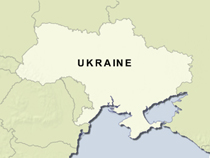voa标准英语2008年-Ukraine's NATO Bid Increases Tensions with Mosc(在线收听)
 Graffiti in Kyiv and other Ukrainian cities reflect polls that indicate more than half of Ukrainians oppose NATO membership.
Graffiti in Kyiv and other Ukrainian cities reflect polls that indicate more than half of Ukrainians oppose NATO membership.Resistance is strong in the country's Russian-speaking eastern and southern regions. Elderly residents in Sevastopol, home of Russia's Black Sea Fleet, have been especially outspoken.
A member of a local pro-Russian group, Albina Gontovaya, fears NATO ships could someday replace those of Russia.
Gontovaya says she and others in Sevastopol can no longer stand the situation with Ukraine, which she accuses of treating them badly. The retiree says nothing good can be expected and she is even resigned to war.
Sevastopol was founded in the late 18th century under Russian Empress Catherine the Great, a hero to many of the city's ethnic Russians who constitute more than 70 percent of the population of more than 340,000. They oppose NATO's eastward expansion and share Russia's fear of encirclement by the alliance.
The head of the local Russian Bloc and a Sevastopol City Council member, Gennadi Basov, questions the need for NATO membership.
Basov asks if NATO is a defense alliance, then who is Ukraine defending itself against? He says it is another matter if NATO is an aggressive bloc for sending troops to fight in Iraq, Afghanistan or Pakistan, adding that would be another reason for Ukrainians not to join the alliance.
In April, NATO rejected Ukraine's bid for a Membership Action Plan, a program designed to prepare prospective members for the alliance. NATO requires each country to meet certain military and democratic standards and does not guarantee membership.
NATO's representative in Ukraine, Belgian national Michel Duray, says the alliance has had an office in Kyiv for 11 years to explain the standards and advantages of membership.
Duray says NATO is not only about tanks against tanks, but it is also about the environment, controlling social instability, and cyber-security, noting there are many aspects included in the notion of security.
Moscow opposes NATO's eastward expansion. In February, then Russian President Vladimir Putin threatened to target Russian nuclear missiles at Ukraine if NATO missiles were deployed there.
The U.S. has been a strong supporter of NATO membership for Ukraine. U.S. Vice President Dick Cheney traveled to Kyiv in September to underscore the point.
There is strong resistance to NATO in the Ukrainian parliament. Lawmaker Dmytro Tabachnyk, who is often accused of being pro-Russian, favors Ukrainian membership in the European Union, but not in NATO.
Tabachnyk says some hold that NATO is an economic growth club, an argument he rejects, pointing out that some of the most developed, wealthy and socially-secure nations in Europe - Austria, Switzerland, Finland and Sweden - do not belong to NATO. He concludes that economic advancement, social protections and civil society are not the same as membership in a military alliance.
In Sevastopol, Sergei Kulyk of the independent NOMOS research institute says Ukraine's size, geo-strategic position and economic potential will not allow the country to remain neutral.
Kulyk says that unfortunately, Ukrainian politicians and leaders have declared a multi-vector policy, but that it is difficult for Ukraine to sit on the fence. He maintains, therefore, that Ukrainians must ultimately decide whether to join Europe or orient their country toward Russia.
Analysts say Russia will only push Ukraine over the NATO issue to the extent Ukrainians allow themselves to be pushed. And Moscow seems likely to exploit this issue as long as it takes Ukrainians to agree on a common position and values - pro-NATO, pro-Russian, or neutral.